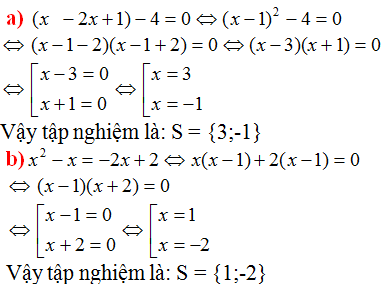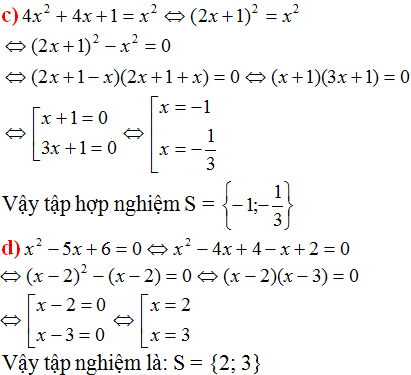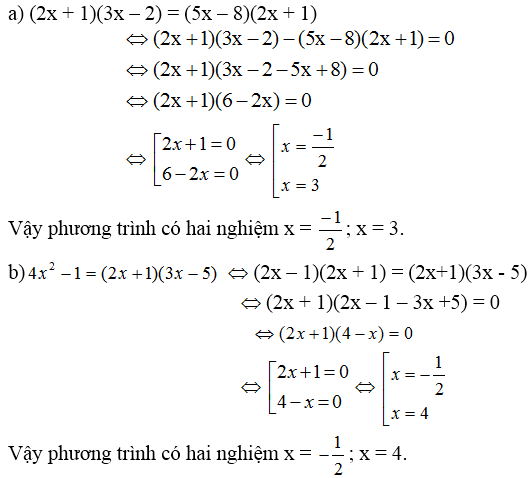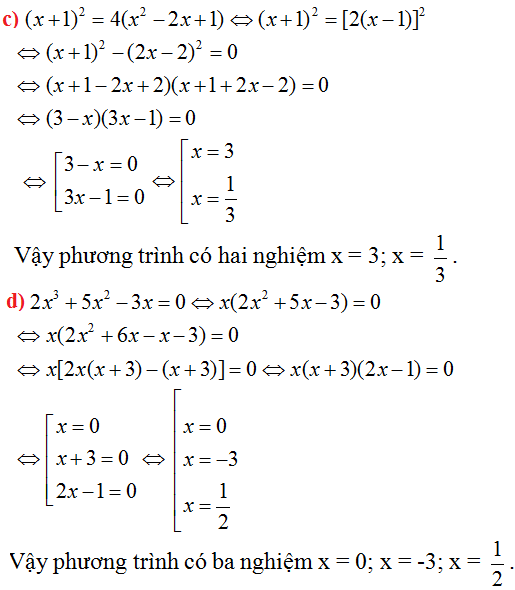Hãy nhập câu hỏi của bạn vào đây, nếu là tài khoản VIP, bạn sẽ được ưu tiên trả lời.

b, \(\left(4x+2\right)\left(x^2+1\right)=0\)
\(\Leftrightarrow4x+2=0\) (Vì \(x^2+1>0\forall x\))
\(\Leftrightarrow x=\frac{-1}{2}\)
Vậy phương trình có nghiệm \(x=\frac{-1}{2}.\)
c, \(\left(x^2-4\right)+\left(x-2\right)\left(3-2x\right)=0\)
\(\Leftrightarrow\left(x-2\right)\left(x+2+3-2x\right)=0\)
\(\Leftrightarrow\left(x-2\right)\left(5-x\right)=0\)
\(\Leftrightarrow\left[{}\begin{matrix}x-2=0\\5-x=0\end{matrix}\right.\Leftrightarrow\left[{}\begin{matrix}x=2\\x=5\end{matrix}\right.\)
Vậy phương trình có tập nghiệm \(S=\left\{2;5\right\}\).
d, \(3x^2+2x-1=0\)
\(\Leftrightarrow3x^2+3x-x-1=0\)
\(\Leftrightarrow3x\left(x+1\right)-\left(x+1\right)=0\)
\(\Leftrightarrow\left(x+1\right)\left(3x-1\right)=0\)
\(\Leftrightarrow\left[{}\begin{matrix}x+1=0\\3x-1=0\end{matrix}\right.\Leftrightarrow\left[{}\begin{matrix}x=-1\\x=\frac{1}{3}\end{matrix}\right.\)
Vậy phương trình có tập nghiệm \(S=\left\{-1;\frac{1}{3}\right\}\).

a)(x2-2x+1)-4=0
⇔(x-1)2-4=0
⇔(x-1-2)(x-1+2)=0
⇔(x-3)(x+1)=0
⇔x-3=0 hoặc x+1=0
1.x-3=0⇔x=3
2.x+1=0⇔x=-1
vậy phương trình có 2 nghiệm:x=3 và x=-1

a) 2x^2 + 3 = 2x(x + 4) - 7
<=> 2x^2 + 3 = 2x^2 + 8x - 7
<=> 2x^2 - 2x^2 - 8x = - 7 - 3
<=> -8x = -10
<=> x = -10/-8 = 5/4
b) 4x^2 - 12x + 5 = 0
<=> 4x^2 - 2x - 10x + 5 = 0
<=> 2x(2x - 1) - 5(2x - 1) = 0
<=> (2x - 5)(2x - 1) = 0
<=> 2x - 5 = 0 hoặc 2x - 1 = 0
<=> x = 5/2 hoặc x = 1/2
c) |5 - 2x| = 1 - x
<=> \(\hept{\begin{cases}5-2x\text{ nếu }5-2x\ge0\Leftrightarrow x\ge\frac{5}{2}\\-\left(5-2x\right)\text{ nếu }5-2x< 0\Leftrightarrow x< \frac{5}{2}\end{cases}}\)
+) nếu x >= 5/2, ta có:
5 - 2x = 1 - x
<=> -2x + 1 = 1 - 5
<=> -x = -4
<=> x = 4 (tm)
+) nếu x < 5/2, ta có:
-(5 - 2x) = 1 - x
<=> -5 + 2x = 1 - x
<=> 2x + 1 = 1 + 5
<=> 3x = 6
<=> x = 2 (ktm)
d) \(\frac{2}{x-1}=\frac{\left(2x-1\right)\left(2x+1\right)}{x^3-1}-\frac{2x+3}{x^2+x+1}\) ; ĐKXĐ: x # 1
<=> \(\frac{2}{x-1}=\frac{\left(2x-1\right)\left(2x+1\right)}{\left(x-1\right)\left(x^2+x+1\right)}-\frac{2x+3}{x^2+x+1}\)
<=> \(\frac{2\left(x^2+x+1\right)}{\left(x-1\right)\left(x^2+x+1\right)}=\frac{\left(2x-1\right)\left(2x+1\right)}{\left(x-1\right)\left(x^2+x+1\right)}-\frac{\left(2x+3\right)\left(x-1\right)}{\left(x-1\right)\left(x^2+x+1\right)}\)
<=> 2(x^2 + x + 1) = (2x - 1)(2x + 1) - (2x + 3)(x - 1)
<=> 2x^2 + 2x + 2 = 2x^2 - x + 2
<=> 2x^2 - 2x^2 + 2x - x = 2 - 2
<=> x = 0
mạn phép vô đây để kiếm câu trả lời
\(2x^2+3=2x\left(x+4\right)-7\)
\(< =>2x^2+3=2x.x+4.2x-7\)
\(< =>2x^2+3=2x^2+8x-7\)
\(< =>2x^2+3-2x^2=8x-7\)
\(< =>\left(2x^2-2x^2\right)-8x=-7-3\)
\(< =>-8x=-10< =>8x=10\)
\(< =>x=10:8=\frac{10}{8}=\frac{5}{4}\)

a, x3 +x2 -12x=0
\(\Leftrightarrow\)x3 +4x2-3x2-12x=0
\(\Leftrightarrow\) x2(x+4)-3x(x+4)=0
\(\Leftrightarrow\) (x2-3x)(x+4)=0
\(\Leftrightarrow\)x(x-3)(x+4)=0
\(\left[\begin{matrix}x=0\\x-3=0\\x+4=0\end{matrix}\right.\Leftrightarrow\left[\left[\begin{matrix}x=0\\x=3\\x=-4\end{matrix}\right.\)
Vậy S\(=\)\(\left\{0;3;-4\right\}\)
b.x3-4x2-x+4=0
\(\Leftrightarrow\)x2(x-4)-(x-4)=0
\(\Leftrightarrow\) (x2 -1)(x-4)=0
\(\Leftrightarrow\)(x-1)(x+1)(x-4)=0
\(\left[\begin{matrix}x+1=0\\x-1=0\\x-4=0\end{matrix}\right.\Rightarrow\left[\begin{matrix}x=1\\x=-1\\x=4\end{matrix}\right.\)
Vậy S=\(\left\{1;-1;4\right\}\)

chẳng ai giải, thôi mình giải vậy!
a) Đặt \(y=x^2+4x+8\),phương trình có dạng:
\(t^2+3x\cdot t+2x^2=0\)
\(\Leftrightarrow t^2+xt+2xt+2x^2=0\)
\(\Leftrightarrow t\left(t+x\right)+2x\left(t+x\right)=0\)
\(\Leftrightarrow\left(2x+t\right)\left(t+x\right)=0\)
\(\Leftrightarrow\left(2x+x^2+4x+8\right)\left(x^2+4x+8+x\right)=0\)
\(\Leftrightarrow\orbr{\begin{cases}x=-2\\x=-4\end{cases}}\)vậy tập nghiệm của phương trình là:S={-2;-4}
b) nhân 2 vế của phương trình với 12 ta được:
\(\left(6x+7\right)^2\left(6x+8\right)\left(6x+6\right)=72\)
Đặt y=6x+7, ta được:\(y^2\left(y+1\right)\left(y-1\right)=72\)
giải tiếp ra ta sẽ được S={-2/3;-5/3}
c) \(\left(x-2\right)^4+\left(x-6\right)^4=82\)
S={3;5}
d)s={1}
e) S={1;-2;-1/2}
f) phương trình vô nghiệm

a)(2x+1)(3x-2)=(5x-8)(2x+1)
⇔(2x+1)(3x-2)-(5x-8)(2x+1)=0
⇔(2x+1)(3x-2-5x+8)=0
⇔(2x+1)(-2x+6)=0
⇔2x+1=0 hoặc -2x+6=0
1.2x+1=0⇔2x=-1⇔x=-1/2
2.-2x+6=0⇔-2x=-6⇔x=3
phương trình có 2 nghiệm x=-1/2 và x=3

\(\left(x-2\right)^2+\left|x-5\right|-x^2-14=0.\)
\(\left(x^2-4x+4\right)+\left|x-5\right|-x^2-14=0.\)
\(x\text{}\text{}\text{}^2-4x+4+\left|x-5\right|-x^2-14=0.\)
\(x\text{}\text{}\text{}^2-x^2-4x+4-14+\left|x-5\right|=0.\)
\(-4x-10+\left|x-5\right|=0\)
.. đến đây xét tiếp để ra kq ạ -,-

c) \(\left|2x-3\right|=4\)
\(\Leftrightarrow\orbr{\begin{cases}2x-3=4\\2x-3=-4\end{cases}}\)
\(TH:2x-3=4\)
\(\Leftrightarrow2x=4+3\)
\(\Leftrightarrow2x=7\)
\(\Leftrightarrow x=\frac{7}{2}\)
\(TH:2x-3=-4\)
\(\Leftrightarrow2x=-4+3\)
\(\Leftrightarrow2x=-1\)
\(\Leftrightarrow x=\frac{-1}{2}\)
Vậy \(x\in\left\{\frac{7}{2};\frac{-1}{2}\right\}\)
e) \(\frac{x-1}{x-3}>1\)
\(ĐKXĐ:x\ne3\)
\(\Leftrightarrow\frac{x-3+2}{x-3}>1\)
\(\Leftrightarrow\frac{x-3}{x-3}+\frac{2}{x-3}>1\)
\(\Leftrightarrow1+\frac{2}{x-3}>1\)
\(\Leftrightarrow\frac{2}{x-3}>0\)
\(\Leftrightarrow x-3>0\)
\(\Leftrightarrow x>3\)




Mình không hiểu đề bài cho lắm bạn có thể ghi lại đề không ??
Lưu ý: kí hiệu này là mũ ( ^ ) nha